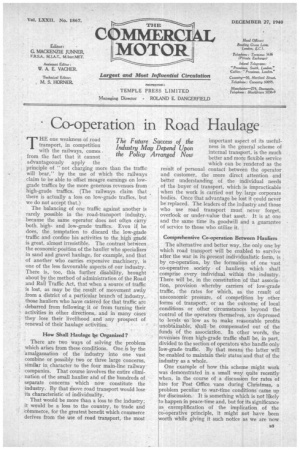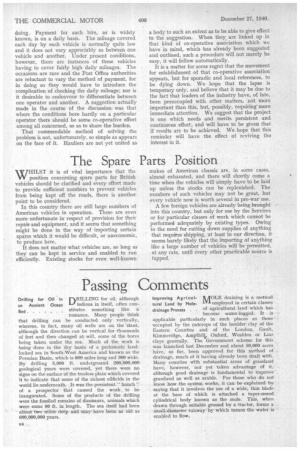Co-operation in Road Haulage
Page 11

Page 12

If you've noticed an error in this article please click here to report it so we can fix it.
THE one weakness of road transport, in competition with the railways, comes . from the fact that it cannot advantageously apply the principle of "not charging more than the traffic will bear," by the use of which the railways claim to be able to offset meagre earnings on lowgrade traffics by the more generous revenues from high-grade traffics. (The railways claim that there is actually a loss on low-grade traffics, but we do not accept that.) The balancing of one traffic against another is rarely possible in the road-transport industry, because the same operator does not often carry both highand low-grade traffics. Even if he does, the . temptation to discard the low-grade traffic and confine his activities to the high grade is great, almost irresistible. The contrast between the economic position of the haulier who specializes in sand and gravel haulage, for example, and that of another who carries expensive machinery, is one of the less favourable aspects of our industry. There is, too, this further disability, brought about by the method of administration of the Road and Rail Traffic Act, that when a source of traffic is lost, as may be the result of movement away from a district of a particular branch of industry, those hauliers who have catered for that traffic are debarred from following it or from turning their activities in other directions,. and in many cases they lose their livelihood and any prospect of renewal of their haulage activities.
How Shall Haulage he Organized?
There are two ways of solving the problem which arises from these conditions. One is by the amalgamation of the industry into one vast combine or possibly two or three large concerns, . similar in character to the four main-line railway companies. That course involves the entire elimination of the small haulier and of the hundreds of separate concerns which now constitute the industry. By that Move road transport would lose its characteristic of individuality.
That would be more than a loss to the industry; it would be a loss to the country, to trade and Wmmerce, for the greatest benefit which commerce derives from the use of road transport, the most important aspect of its usefulness in the general scheme of internal transport, is the much better and more flexible service which can be rendered as the resUlt of personal contact between the operator and customer, the more direct attention and better understanding of the individual needs of the buyer of transport, which is impracticable when the work is carried out by large corporate bodies. Once that advantage be lost it could never be replaced. The leaders of the industry and those who use road transport must never forget, overlook or under-value that asset. It is at one and the same time its goodwill and a guarantee of service to those who utilize it.
Comprehensive Co-operation Between Hauliers The alternative and better way, the only one by which road transport will be enabled to survive after the war in its present individualistic form, is by co-operation, by the formation of one vast co-operative society of hauliers which shall comprise every individual within the industry. There will be, in the constitution of that association, provision whereby carriers of low-grade traffic, the rates for which, as the result of uneconomic pressure, of competition by other forms of transport, or as the outcome of local conditions or other circumstances beyond the control of the operators themselves, are depressed to levels so low as to make reasonable profits unobtainable, shall be compensated out of the funds of the association. In other words, the revenues from high-grade traffic shall be, in part, divided to the section of operators who handle only low-grade traffic. By that means the latter will be enabled to maintain their status and that of the industry as a whole.
One example of how this scheme might work was demonstrated in a small way quite recently when, in the course of a discussion for rates of hire for Post Office vans during Christmas, a problem peculiar to war-time conditions came up for discussion. It is something which is not likely to happen in peace-time and, but for its significance as exemplification of the implication of the Iw-operative principle, it might not have been worth while giving it such notice as we are now doing. Payment for such hire, as is widely known, is on a daily basis. The mileage covered each day by each vehicle is normally quite low and it does not vary appreciably as between. one vehicle and another. Under present conditions, howev,er, there are instances of these, vehicles having to cover fairly high daily mileages. The occasions are rare and the Post Office authorities are reluctant to vary the method of payment, for in doing so they would have to introduce the complication of checking the daily mileage; nor is it desirable to endeavour to differentiate between one operator and another. A suggestion actually made in the course of the discussion was that where the conditions bore hardly on a particular operator there should be some co-operative effort among all concerned, so as to share the burden.
That commendable method of solving the problem is not, unfortunately, so simple as appears on the face of it. Hauliers are not yet united as a body to such an extent as to be able to give effect to the suggestion. When they are linked up in that kind of co-operative association which we have in mind, which has already been suggested and outlined, such a procedure will not merely be easy, it will follow automatically.
It is a matter for some regret that the movement for establishment of that co-operative association appears, but for sporadic and local references, to be dying down. We hope that the lapse is temporary only, and believe that it may be due to the fact that leaders of the industry have, of late, been preoccupied with other matters, not more important than this, but, possibly, requiring more immediate attention. We suggest that the project is one which needs and merits persistent and continuous effort, and will have to be given that if results are to be achieved. We hope that this reminder will have the effect of reviving the interest in it.














































